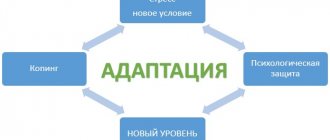Reflection. Full development of personality requires constant acquisition of new information, as well as the ability to realize and “process” the acquired knowledge.
Reflection in psychology is a person’s ability to understand the degree of his uniqueness, know his purpose, correctly formulate thoughts and interact with the world around him.
Reflection
In simple words, reflection is the ability to look into your inner world, actions taken, knowledge gained and future endeavors.
To reflect means to focus on your own consciousness. A person begins to reflect on his inner world, tries to compare himself with others and tries to look at himself from the outside.
Reflection, it is not literally thinking, is a mistake to identify these concepts.
Reflection relates to thinking in much the same way as bodybuilding relates to weight training, that is, as free leisure relates to sports.
MAXIM KANTOR. DRAWING TEXTBOOK
Definition
The word "Reflection" is of Latin origin. Literally speaking, it means “to look back.” In psychology, reflection is called introspection or introspection. They can be called synonyms.
The definition of reflection is the totality of a person’s thoughts about his life and actions, as well as subsequent assessment of himself. A person is able to evaluate himself using communication mechanisms. For this reason, the existence of such a concept as reflection is impossible without communication.
Self-observation can be different:
- Ordinary reflection - a person thinks about his actions, notices the mistakes he has made, but does not get hung up on it.
- Deep reflection - a person engages in soul-searching, analyzes his actions and the response of society. This includes reflections on the universe and moral standards.
Any human action can become reflexive. For example, feelings, actions, words, impulses, emotions. They become reflexive if a person turns to his consciousness and tries to carry out introspection.
Thanks to reflection, a person thinks and fantasizes, goes into the world of dreams and begins to feel like a part of reality. By creating a picture of an ideal world in his head, he begins to feel like a certain person and acts in society according to his attitudes.
What it is
This term comes from the Latin word reflecto, which means turning back . The correct way to say “reflection” is to emphasize the letter E.
Reflection is the skill of concentrating attention and one’s own thoughts inward: evaluating one’s actions, making decisions, being aware of one’s feelings, emotions and sensations.
This is an understanding of one’s own “I”, constructive criticism of one’s actions, comparing oneself with others for compliance with established norms and rules. A reflective person becomes an outside observer of himself.
The ancestor of this term is considered to be the science of philosophy. She interprets reflection as a tool for thinking about human existence. Socrates wrote that this phenomenon is the only way for internal improvement and spiritual progress through liberation from obsessive thoughts, stereotypes and prejudices.
Pierre de Chardin wrote in his scientific works that reflection is not only knowledge, but also the ability to be aware of this knowledge . He also noted that this property is available only to humans (like consciousness), which is considered the most developed form of life of all existing on the planet.
Reflection has been studied by many philosophers: their views are similar, so there is no point in writing about them separately.
Types of reflection
Reflection is a complex and multifaceted concept. It has many definitions, depending on the situation.
There are several main types of reflection:
- Personal character - a person gets to know his inner world, thinks about his inner “I”.
- Communicative in nature - a person analyzes his relationships with the outside world, other people, loved ones and acquaintances.
- Cooperative in nature - a person thinks and analyzes the possibility of achieving a certain goal by acting together with someone.
- Intellectual - thinking about certain knowledge and the possibility of applying it in real life.
- Existential in nature - a person is immersed in deep and very personal reflections.
- Sanogenic nature - attempts to control a stressful situation, get rid of negative emotions, experiences and suffering.
There are also several other types of reflection, depending on the situation in which a person finds himself.
Is it possible to develop your reflection?
As has already become clear, for any person to reflect means to grow above oneself spiritually. Is it possible to work on this process and stimulate your spiritual and moral development?
What does it mean to reflect? To put it simply, to reflect means to respond to external stimuli. Conflict, problems, confrontation, dialogues, choices, doubts - all this happens to a person every day. The more such experiences a person has, the richer his reflective amplitude.
A reflective person is a kind of his own psychoanalyst, who knows how to pose a problem and find a solution in his own experience, in his own experiences.
The peculiarity of a living mind is that it only needs to see and hear a little so that it can then think for a long time. You can try the method of thoughtfully rethinking a work of art in relation to any person. How many hours do you think about the book you just read, the movie you watched, the picture you saw? Hour, day, week? Do you project events from the book onto yourself, do you try to analyze your actions in the context of the fictional plot?
This is your reflective training. As a kind of reflection training, we can recommend writing down on a piece of paper the most significant and important issues that concern you throughout your life. Once you have them all in one place, try to mark the questions with different colored markers and figure out what most of your questions are about. About the meaning of life? About your activities? About relationships with others? About the material component? About future?
Having analyzed your aspirations in this way, you can continue reflection in the most problematic direction, becoming more perfect and continuing your own spiritual development.
Forms of reflection
There are several forms of introspection, depending on the situation in which a person’s thoughts begin:
- Situational form - a person reacts to the situation that he is faced with at the moment.
- Retrospective form - analysis of events that happened in the past.
- Prospective form - a person makes plans for the future, dreams and sets certain goals.
What our time lacks is not reflection, but passion.
Because our time is too tenacious to die, for dying is one of the most amazing leaps.
SÖREN KIERKEGARD. FEAR AND TREMENDING
Reflective man
Within the framework of many philosophical concepts, reflection is considered as one of the more essential properties of consciousness. In accordance with this statement, only those beings who are aware of the states of their psyche can be considered conscious and thinking. Simply put, a person who is unable to analyze his mental states cannot be called thinking. Emotional, creative, but not thinking.
The reflexivity of a newborn is zero - he perceives the world around him as a given, his parents as an unconditional component of this world. In the process of maturation and increasing autonomy from parental care, the growing individual begins to see and comprehend contradictions. This causes him to accept or not accept parental authority, and to critically comprehend the actions of loved ones. The mechanism of reflection has been launched, and from now on a person can only improve and grow spiritually and morally.
Reflection cannot be the same for individual people. Its level also varies depending on the age of the person. Reflection has the greatest activity and amplitude at the very beginning of the development of the human personality - at the stage of childhood and adolescence, adolescence. By the middle of life's journey, reflection noticeably slows down its rhythm, and by the end of life it stops altogether.
Social reflection
In social life, reflection is a kind of awareness of a person of who he is for other individuals. In other words, social reflection in psychology is not only a person’s awareness of himself, but also an understanding of how other people treat him.
This includes a person’s personality traits, reactions to various events, emotional impulses, mood and character. When joint activity arises between members of society, social reflection turns into subject-reflective relationships.
Reflection as a mental process
Words with the root “reflex”, which comes from the Latin reflexus (reflected), are often used in psychology. The most common, in fact, reflex is the body’s response to any impact. But unlike an innate, spontaneous reaction, reflection is a conscious process that requires serious intellectual effort. And this concept comes from another Latin word - reflexio, which means “turning around”, “turning back”.
What is reflection
Reflection in psychology is understood as a person’s comprehension and analysis of his inner world: knowledge and emotions, goals and motives, actions and attitudes. As well as understanding and assessing the attitudes of others. Reflection is not just an intellectual activity, but a rather complex spiritual activity associated with both the emotional and evaluative spheres. It has nothing to do with innate reactions and requires a person to possess certain skills of self-knowledge and self-esteem.
Reflection also includes the ability to self-criticize, since understanding the reasons for one’s actions and thoughts can lead to not the most pleasant conclusions. This process can be very painful, but reflection is necessary for normal personality development.
Two sides of reflection
Subjectively, that is, from the point of view of the person himself, reflection is felt as a complex set of experiences in which two levels can be distinguished:
- cognitive or cognitive-evaluative, it manifests itself in awareness of the processes and phenomena of one’s inner world and their correlation with generally accepted norms, standards, and requirements;
- the emotional level is expressed in the experience of a certain attitude towards oneself, the content of one’s consciousness and one’s actions.
The presence of a pronounced emotional side distinguishes reflection from rational introspection.
Undoubtedly, it’s nice to think about your actions and exclaim: “What a great fellow I am!” But often the reflexive process brings us far from positive emotions: disappointment, a feeling of inferiority, shame, remorse, etc. Therefore, a person often consciously avoids reflection, trying not to look into his soul, fearing what he might see there.
But psychologists also recognize that excessive reflection can turn into self-examination and self-flagellation and become a source of neuroses and depression. Therefore, we must ensure that the emotional side of reflection does not suppress the rational.
Forms and types of reflection
Reflection manifests itself in different areas of our activity and at different levels of self-knowledge, therefore it differs in the nature of its manifestation. Firstly, there are 5 forms of reflection depending on the focus of consciousness on a particular area of mental activity:
- Personal reflection is most closely related to emotional-evaluative activity. This form of understanding a person’s inner world is aimed at analyzing significant components of personality: goals and ideals, abilities and capabilities, motives and needs.
- Logical reflection is the most rational form, which is aimed at cognitive processes and is associated with the analysis and assessment of the characteristics of thinking, attention, and memory. This form of reflection plays an important role in educational activities.
- Cognitive reflection is also most often observed in the field of cognition and learning, but unlike logical reflection, it is aimed at analyzing the content and quality of knowledge and its compliance with the requirements of society (teachers, lecturers). This reflection not only helps in educational activities, but also helps to broaden one’s horizons, and also plays an important role in adequately assessing one’s professional abilities and career opportunities.
- Interpersonal reflection is associated with understanding and assessing our relationships with other people, analyzing our social activities, and the causes of conflicts.
- Social reflection is a special form, which is expressed in the fact that a person understands how others treat him. He is not only aware of the nature of their assessments, but is also able to adjust his behavior in accordance with them.
Secondly, we are able to analyze our past experience and foresee possible developments of events, therefore there are two types of reflection related to the time aspect of evaluative activity:
- Retrospective reflection is an understanding of what has already happened, an assessment of one’s actions, victories and defeats, an analysis of their causes and learning lessons for the future. Such reflection plays an important role in organizing activities, since by learning from one’s mistakes, a person avoids many problems.
- Prospective reflection is the anticipation of possible results of actions and assessment of one’s capabilities under different scenarios. Without this type of reflection, planning activities and choosing the most effective ways to solve problems is impossible.
It is quite obvious that reflection is an important mental process that a person needs in order to achieve success, to become a person of whom he can be proud, and not to experience a loser complex.
Reflection in the psychology of communication
Reflection occupies a special place in psychology because it is a form of self-knowledge. It plays a major role in communication with society, allows you to be aware of your actions and understand other people. Self-analysis allows a person to build relationships with other people.
Reflection in the psychology of communication helps to see everything that is happening from the outside. An example is the inappropriate behavior of a particular person or one’s own mistakes. Through self-analysis, a person will realize that he should not interact with a certain person or realize that he behaved incorrectly. Thus, reflection will help you eliminate unnecessary people from your life and resolve conflicts.
Reflection is the search for answers to all existing questions related to a person’s personality. With its help, all personal problems of a person are solved. The individual is not even aware of the role reflection plays in his life. Periodically thinking about his attitude towards life and people, he conducts introspection, sees his own shortcomings and tries to correct them, depending on his moral values.
What is the use of reflection?
Reflective activity opens up new possibilities for a person.
Thinking over his actions and deeds, he learns to live correctly:
- It becomes possible to control your thinking. A person tries to think in the right direction.
- Reflection promotes self-criticism, which allows you to see your own shortcomings, analyze them and work on mistakes.
- Self-analysis allows you to get rid of negative and depressing thoughts that poison human existence.
- The analysis of experienced life situations begins, with subsequent conclusions.
- Realizing past mistakes, an individual develops a strong personality and acquires his own position.
In the process of reflection, personal growth is observed. A person changes and learns from his mistakes without repeating them in the future. But if a person lacks reflection, then he repeats similar mistakes and does not understand the cause of his distress.
What is reflection?
A certain category of people are prone to constant introspection. But most of the population does not think about their actions.
There are several ways to develop reflection and look at the world differently.
- Try to analyze your day. Analysis must be done down to the smallest detail, down to random encounters, individual dialogues, unpleasant situations and joyful events.
- Read the relevant literature.
- Take some time to reflect.
- Write down a few important issues that need to be addressed. Try to think of a possible way out.
Important: The main way to develop reflection is communication. By contacting the outside world, experiencing positive and negative moments, a person learns self-analysis. After a long and eventful day, you should think a little about your experience and try to derive some benefit from it.
Other types of reflection
As mentioned above, there are many types of reflection.
There are three main types, depending on the direction of a person’s thinking:
- Elementary type . Such reflection is typical for almost every person. The appearance of difficult situations in life forces us to turn to introspection and try to understand what led to the sad outcome. By reflecting on the actions taken, a person can find answers to all questions for himself.
- Scientific type . Reflection is also used in various studies and experiments. With its help, it is possible to confirm or refute certain theories from a scientific point of view.
- Philosophical kind . Philosophical reflection is devoted to high questions. We are talking about questions of existence and the universe, the true meaning of life and the purpose of man. If a person is able to think so deeply and periodically thinks about serious issues, this shows a high level of his intelligence.
Examples of reflection from life
The modern rhythm of life does not allow us to think about important and serious issues. In fact, in the world around us there are many opportunities to develop reflection and look at life differently.
Try to think
Social networks on the Internet provide a person with so much information that there is not even time left to think about it. People no longer have to put in effort or introspection, because all they have to do is type a query online to get an answer. For this reason, reflection is not developed in most of the population.
Experts say that a large amount of various information harms a person. A large flow is not absorbed by the brain, as a result only fragmentary pictures and phrases remain, which will not be useful. The brain is designed to think about a specific topic.
Without getting out of the rhythm of life, you can develop reflection in yourself. An example from life could be a common action. It’s enough to choose one case, for example, a book you read, a movie you saw, or a trip to a museum, and then answer yourself the following questions :
- Was there any benefit from this?
- Have I received new information?
- How can I use this experience?
- Did I like the character (place)?
- What did I learn from this?
This will allow you to relax and concentrate at the same time. While a person answers the questions that interest him, the brain will actively act and develop reflection.
Keep a special notebook
The tendency to introspection is developed by a special attitude towards life. It is important to pay attention to all the details and try to even think about what could cause negative emotions. This is the only way a person can realize his mistakes.
Reflection develops from an early age, but once you start thinking about all your actions, you can do this even in adulthood. A person must think about the most important and pressing issues in his life, even if they may cause him pain. There should be a lot of questions, because they cover the whole life.
After this, all this should be written down in a special notebook, dividing the questions into the following categories:
- Questions about life and death . Philosophical reasoning, the meaning of life and purpose.
- The main goal in life . Did you manage to achieve it? If not, then for what reasons?
- Relationships with others . Not only well-wishers should be included, but also those with whom relations have been damaged. Answer the question “why did this happen and how could it have been avoided?”
- About the spiritual world, religion and God.
- About past mistakes and actions . Answer the question “what did I do wrong and how could I fix it?”
- About plans and cherished dreams . Answer the question “how can I achieve this”.
- About material values . Answer the question “what is most important to me in my life.”
Important: Most of these questions can cause serious difficulties for a person, because they must answer honestly. Reflection involves introspection. A person must be able to recognize not only his positive sides, but also his shortcomings. By answering all the questions honestly and analyzing them, a person can learn a lot about himself.
A little bit of history. Reflection and spirituality
Reflection was given attention back in ancient Greek philosophy: Socrates highlighted the process of human self-knowledge, the subject of which was spiritual activity and its cognitive functions. A person who rejects knowledge and refuses self-knowledge is not capable of becoming a spiritual and moral person, is not capable of development. To reflect means to develop, to grow spiritually.
For Plato and Aristotle, reflection and thinking were attributes inherent in the demiurge, the divine mind. Only supermind, in their understanding, was capable of the unity of the conceivable and thought. This concept passed into Neoplatonism, which argued that reflection is nothing more than the peacemaking activity of the deity. This theory is not without meaning and is found in modern interpretations. The fact is that reflection can be performed from two positions. The first position is when comprehension occurs by the individual: Self-reflection. Who knows me better than myself and can analyze my thoughts and aspirations? Only myself.
The second position is non-I-reflection. But who besides me can penetrate my consciousness? Only God, who has the properties of personality.
Thus, a believer not only reflects and experiences his actions, he scans his experiences, thinking about how God relates to his actions. Is his life righteous, is he a sinner?
The result of such reflection is doubled, and the effect of such introspection is certainly stronger.










